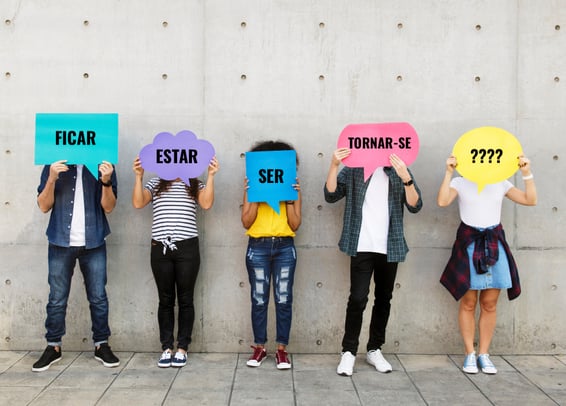The verb ficar is a very common, and important, Portuguese verb. Ficar is sort of like a Swiss army knife, as it can take on many meanings… but you also have to be careful with it!
In most cases, this verb means to be, to stay, to become, or to keep. It implies that something happened or will happen, or that something changed (and that change can be either permanent or temporary). It can also be used to indicate the placement of objects, cities, buildings and so on (especially unmovable objects), or talk about the location where a certain object is usually stored.
You can explore the different verb conjugations here.
We’ll also discuss the difference between ficar vs. ser vs. estar vs. tornar-se, as these are often difficult for non-native speakers to differentiate.
Most Common Meanings of Ficar
Stay
Eu vou ficar em casaI'm going to stay home
Fica comigoStay with me
When the meaning is “staying/being at”, the verb ficar is referring either to the near future or to something recurrent. We can explain this by giving some context to the first example: Jantem fora vocês que eu fico em casaYou dine out and I'll stay home . Ficar helps to portray the idea that I will continue to be at home while you are eating out.
Become

O Pedro ficou ansiosoPedro became anxious
Ficámos muito amigosWe became very good friends
Be (located)
A Torre de Belém fica em LisboaThe Tower of Belem is located in Lisbon
Onde fica a tua casa?Where is your house?
Keep

Ela ficou com o cãoShe kept the dog, She stayed with the dog
Fica em silêncioKeep quiet, Stay in silence
O carro fica na garagemThe car is kept in the garage, The car stays in the garage
Turn out / End up
Acabou por ficar tudo bemEverything turned out fine
Como é que ficou o pudim?How did the pudding turn out?
Be left with

Ficámos sem nadaWe were left with nothing
Ficámos sozinhosWe were left alone
Fit (clothing)
Estas calças ficam-me apertadasThese pants are tight on me – i.e. fit me tightly
Other Meanings Within Expressions
Ficar also makes an appearance in many common expressions. The exact translation may not always be straightforward, but as you see and hear more examples, you’ll start to get a sense of the meaning the word imparts on a phrase:
O jogo ficou empatadoThe game ended in a draw, The game was tied
Temos de ficar de péWe have to stand, Literal - We have to stay on foot
Vai ficar para a históriaIt will go down in history
Os fãs ficaram loucosThe fans went crazy
Vou ficar por aquiI'll stick around, Literal - I'll stay around here
Ficar vs. Ser vs. Estar vs. Tornar-se

As you can see, ficar is quite versatile! However, you may have also noticed that it sometimes shares a similar meaning to a few other common verbs. So how do you know which one to use? The following section will highlight the similarities and differences between ficar, ser, estar, and tornar-se in order to help you better understand when you can use the verb ficar, and when you can’t.
Ficar vs. Estar
While ficar is generally associated with change, estar is often used with temporary qualities and traits, as well as the location of movable objects.
For the most part, ficar and estar cannot be replaced with one another without, at least, reconstructing the whole sentence. Let’s look at some simple sentences that illustrate these differences in meaning:
O meu filho fica em LisboaMy son stays in Lisbon
O meu filho está em LisboaMy son is in Lisbon
Eu vou ficar com eleI'm going to stay with him, I'm going to keep it
Eu vou estar com eleI'm going to be with him
Estás a dever-me um almoçoYou owe me a lunch
Ficas a dever-me um almoçoYou (will) owe me a lunch (after this)
The only situations in which ficar and estar are practically always interchangeable is when talking about the placement of buildings or locations:
Viseu está perto da Serra da EstrelaViseu is near Serra da Estrela
Viseu fica perto da Serra da EstrelaViseu is near Serra da Estrela
O museu está situado na Rua XThe museum is located on Street X
O museu fica situado na Rua XThe museum is located on Street X
However, with movable objects, the meaning is a little different. Using ficar implies that that is the usual location for an object, while estar just indicates the current location:
A caneta fica na mesaThe pen (usually) stays on the table
A caneta está na mesaThe pen is on the table
There are, of course, some ‘exceptions’ in which, despite there being a slight technical difference in meaning between the verbs, we treat them the same in casual conversations. For example, it’s common to use estar and ficar interchangeably when referring to how clothes fit:
Essas calças ficam-te apertadasThose pants are tight on you (when you put them on)
Essas calças estão-te apertadasThose pants are tight on you (in this very moment)
Here are a few more examples in which the meanings are technically different, but they are casually used interchangeably:
Fica à vontadeMake yourself at home, Be my guest, Feel free to...
Estás à vontadeBe my guest, Feel free to..., You're welcome to...
Cada vez fico mais convencido...I become more and more convinced...
Cada vez estou mais convencido...I'm more and more convinced...
Ficar vs. Ser
These two verbs are even more different from one another. As mentioned in a previous Learning Note, ser is often used with inherent or intrinsic qualities and personality traits as well as with professions. Ficar can’t be used with the latter and, when talking about qualities or traits, it means becoming, as opposed to being.
Eu sou bonitoI am pretty
Eu fico bonitoI become pretty, I'll get pretty
Vais ser arquitetoYou'll be an architect
Vais ficar aquitecto
Similarly to what happens with the verb estar, though, ser and ficar can both be used when talking about the unmovable location of a building, store, or room, for example.
A casa de banho é ao fundo do corredorThe bathroom is down the hall
A casa de banho fica ao fundo do corredorThe bathroom is down the hall
O restaurante é já aquiThe restaurant is over here
O restaurante fica já aquiThe restaurant is over here
Ficar vs. Tornar-se
While the verb tornarcome back, make is not interchangeable with ficar, its reflexive version, tornar-sebecome , can be. This is because tornar-se also involves a change of state, as something or someone becomes something else.
Vamos ficar amigosWe will become friends
Vamos tornar-nos amigosWe will become friends
Ficou claro que não queres saberIt became clear that you don't care
Tornou-se claro que não queres saberIt became clear that you don't care
This only works with more definite or lasting changes. When talking about less permanent things, like moods and feelings, you should not use tornar-se.
Fiquei irritadoI became upset, I got upset
Estou irritadoI am upset
Tornei-me irritado
To Sum it Up…
We hope these examples gave you a good overview of the verb ficar in Portuguese. Don’t worry if it’s not crystal clear. That’s just the nature of language! Even natives often have a hard time explaining the differences and why one is used over the other. As is usually the case, it takes time and experience to become comfortable with the variety of contexts for using this verb, so it’s important to spend some time exploring the examples.
In an attempt to simplify something not so simple, just remember that while there are a lot of exceptions and technical differences, you can usually use ser, estar, and ficar interchangeably when talking about location, but in other contexts you need to be much more careful. One of the primary differences is that ficar often implies change in state.
Now, let’s move on to the lesson exercises to start practicing in context! (coming soon)



Thank you very much ! This is an exhaustive and clear explanation!
Great explanation. Not too much not too little.
Finally!
I have been wondering what the deal is with ficar for a long time. All over the place!
Thank you. Your lessons are the best Portuguese lessons I can find on the Internet.. Extremely helpful, comfortable and well suited for memorizing.
Although very complicated your explanations of the verb ficar are clear and concise. I am trying to improve my grasp of the language, the grammar is so complicated ( at least for me). I am retired and my memory is not as good as it was . I live part of the year in Wales U.K. and also VRSA Eastern Algarve. Obviously the current Covid situation prevents me from visiting Portugal.
I am looking to practice my book and internet learning by practising and improving this with speech.
Do you offer this via Skype or FaceTime or do you know anybody in Portugal who does?
Any help or advice would be appreciated
Kind Regards
Phill Murray,
Thanks Phill, glad to hear this was useful for you! Unfortunately I don’t know of anyone in particular to recommend for Skype/Facetime practice. I know some people use sites such as iTalki, but you just have to make sure you find someone who speaks European Portuguese to practice with (as most of the tutors are Brazilian).
We don’t offer live speaking practice, but we do have an automated speaking practice component as part of our online lessons, which are available as part of a subscription. If you’re interested, you can read more about what’s included here: Membership Benefits
Best of luck! Feel free to reach out at [email protected] if you have any other questions. 🙂
Hi Phill, you might try certified English/European Portuguese teacher Celeste Santos at [email protected]
I highly recommend Português Comum. Sara’s email is: [email protected]
I’ve taken lessons with her in person in Porto and during covid by Skype.
Thanks guys, I have been awaiting the release of this unit for a long time and the explanation as always does not disappoint.
You are the best.
Well explained although I found the whole thing quite complex and complicated.
Thanks ,
Stella
Opens interesting reflection over culture of understanding and insights of meaning with verb fincar!!! Never seen such finesse of meaning with the usage of one verb. I have messed up with other languages like Italian, German, French, Spanish, Romanian, English but never came across with anything similar. Vai ficar para a historia!!!!! DrEl
The more I read through this lesson, the more I learn. It would be helpful to add more opportunities to listen to the sentences or words being spoken. In the places where you’ve done that, it adds an important layer of information in how to speak.
Thank you! The phrases without audio are on the list to be recorded. 🙂
Your explanation is so good. Thank you so much.
The more I learn the less I seem to know!
Excellent explanation as always.
Esta aula é uma maravilha.
Sempre custava-me conhecer todos os jeitos do uso do verbo “ficar”. Esta aula responde às minhas dúvidas que eu tive. Efetivamente fico mais confiante para usar este verbo.
Bryan Ung de Macau
Rui e Joel; Thanks for this most instructive lesson on what is a somewhat judgemental issue, delivered succinctly.
It sounds like one word with many different meanings. I’ve never used it after studying for over 6.5 years so maybe I can keep using the words I’ve been using until I can learn how to use it. Thanks!
Muita boa explicação do verbo ´ficar´, obrigado.
Vais ficar arquiteto (not correct), but Vamos ficar amigos (correct). Is this so, because arquiteto is a profession, therefore not changeable, and amigo is a state of relationship, which can change?
Thanks for your answer, Jutta
Olá, Jutta. Yes, in a context where we want to say “You’ll be/become an architect”, we don’t use the verb “ficar”. We would understand it literally as “You’ll stay an architect”, which is not quite the same or at least doesn’t sound natural. This applies to professions in general, but not necessarily because of a temporary vs. permanent thing – after all, we can change professions too! It’s just how the language has evolved, I suppose 🙂
Thank you very much for this comprehensive and useful explanation. I’ve always thought that when you’re talking about the location of cities/countries/streets/buildings, et cetera, you would have to use “ficar” or “ser” and not “estar” So I still have difficulty in understanding the sentence in one of the examples ‘Viseu está perto da Serra da Estrela (Viseu is near Serra da Estrela). Could you explain this, please?
Olá. Thank you too for your comment! Locations (of both fixed and movable objects) are one of those pesky exceptions to the rule, since they generally accept all three verbs, “ficar”, “ser” and “estar”. And honestly, I have no good explanation for that. Just one of those Portuguese things? 🙂
Thank you very much for the further explanation, I will keep it in mind
Hi
Good reading! Todays languages are evolving. Nice to grasp the knowledge of the language from different perspectives! Thank you and all the very best!
Hi, Thanks for the detailed explanation about the usage of Ficar they are very helpful.
I just have a question about Ficar in terms of to Turn out / End up. What’s the difference between using Acabou por + Ficar and without Ficar.
Example.
Diga-nos como acabou por voltar para cá.
Ela acabou por ficar com o tipo certo.
I’m trying to understand when do you have to include the verb ficar and when it’s not needed.
Olá! It’s not “ficar” that means “end up”, but actually “acabar por”. So that’s the part of the sentence that you can consider adding or not adding depending on how you want to express yourself. If you want to just be straightforward, you’ll leave “acabar por” out and just use the main verb. For example:
– Diga-nos como voltou para cá. (Tell us how you came back here)
If you want to add the “end up” bit, then you’ll add “acabar por”:
– Diga-nos como acabou por voltar cá. (Tell us how you ended up coming back here)
“Voltar” is the truly important verb here and you can’t leave it out. Same for “ficar” in your other example 🙂
Olá Joseph, Thanks for clarifying that for me.
Ola! Would we then say Vais tornar-se arquiteto for You will become an architect?
You will become an architect = Vais tornar-te um arquiteto.
An excellent explanation of the different usages of the verb ficar .
However I am slightly confused as to why you have used the verb saber to mean care. in “Ficou claro que não queres saber”
Obviously the more common usage of this expression would be “It became clear that you dont want to know”
Can you please advise why you chose the more colloquial expression “dont want to care ” in the example.
Thank you for your comment!
Using “não querer saber” in the sense of “not caring” is very common for native speakers. So, without the benefit of having additional context, either meaning is quite plausible. In cases like this, we usually just want to make sure learners are aware of all common possibilities, which is why you will find examples of both uses of the verb throughout the website.
I find the construction of these lessons extremely interesting and well done. Some of the patterns I’m seeing reinforce words and sentence structure, although still confusing at times. The shorties are cool and entertaining but I’d also recommend , atleast for me, would be to add reading short stories like “A Cidadela Misteriosa” that keeps you captivated with in a full story line. I was actually surprised with how much i do understand and have retained.
Thanks for the distinction between ficar and tomar-se. Is it also true that ficar would be used when you become an adjective like hungry or thirsty whereas tomar-se is used when you become a noun (i.e. become a man).. I guess this is another way of saying impermanent versus permanent. But another question…in your cognates unit you say “Ela tornou-se numa artista famosa”. Why numa and not just uma? It seems like this translates the verb as “turned into” an artist, rather than “became” which in English would not require the “ into”.
Yes, “ficar” is usually applied for more dynamic/impermanent states, while “tornar-se” implies a deeper, lasting change, whether or not you describe it with adjectives or nouns. So, “ficou triste” and “tornou-se triste” are both grammatically possible, but are interpreted quite differently.
The verb tornar(-se) optionally accepts the preposition ’em’. So, “tornou-se numa” and “tornou-se uma” are both possible (although the latter sounds arguably better or is perceived as more correct, depending on who you ask).
In the examples above you use the following :
O museu está situado na Rua X
Does the location of the museum not have permanency to it, and if so, should the sentence not be “O museu é situado na Rua X”?
Thank you in advance
Olá. Physical locations are an important exception to that temporary/permanent rule of thumb (really just ‘rule of thumb’, and not an actual rule). We can use the verbs ser, estar and ficar pretty much interchangeably to indicate the location of something.
The sentence “O aeroporto fica a cinco quilómetros de/da minha casa” contains “fica a”. What is the “a” here?
Thanks in advance,
“A” is a preposition here 🙂 It’s as if we were saying that it’s AT a distance of 5 km.
The sentence “Fico-te grato por me ajudares” contains the infintive ajudar with “es” at the end. I assume this indicates “you” somehow.
What tense is this, and why is it used in this example?
Thank you in advance.
The sentence “Fico-te grato por me ajudares” uses the personal infinitive “ajudares”, which is a unique form in Portuguese. This form does indicate the informal “you” and is used to show that the action of the verb “ajudar” (to help) is related to the second person singular (you). It’s a verb form that conveys a sense of subjectivity to the infinitive.
You can read more about the personal infinitive and how it differs from the impersonal infinitive in this Learning Note: https://www.practiceportuguese.com/learning-notes/impersonal-vs-personal-infinitive/
🙂
This post on “ficar” was super helpful! I had no idea that it could mean so many different things depending on the context. The examples you provided really clarified how to use it in everyday conversation. Thanks for the great tips!
I think this type of information about a single word is what overwhelms me and makes me feel there is no way I will ever be fluent in Portuguese. If there is that much to learn for ONE WORD it’s too much! I think the explanation is great, just makes me feel fluency is impossible sadly
Olá, Colleen! I understand how overwhelming this particular learning note can be. The key is not to focus on memorizing every possible usage of a word right away. Instead, think of this as an introduction to the different ways ficar can be used. Over time, as you encounter the word in various contexts, its different meanings will start to make more sense and become more natural to you. For now, just knowing that ficar has multiple uses is a great starting point. This awareness will help you keep an open mind and make connections more easily as you continue to learn and practice. Every learner feels this way at some point, and it’s all part of the journey towards fluency.
This post about “ficar” is fantastic! I love how you highlighted the different meanings and contexts in which the verb is used. It really helps clarify the nuances that can be so confusing for learners. Thanks for the great examples!
This blog post on “ficar” is incredibly helpful! I never realized how versatile this verb could be in different contexts. The examples you provided really made it clear. I can’t wait to practice using it in my conversations! Thank you for such an insightful read!